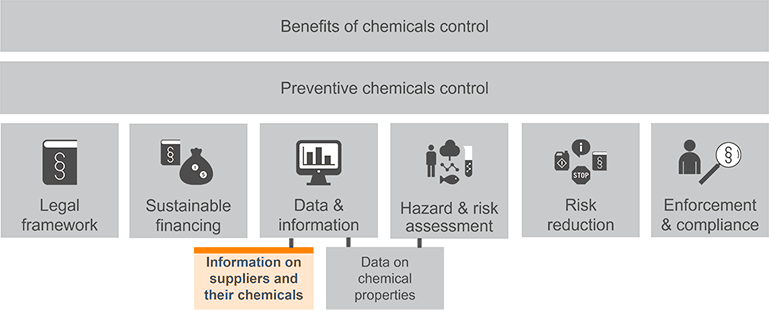Information on suppliers and chemicals on the market
When setting up systems for chemicals management and developing and implementing legislation on chemicals placed on the market, there are a number of tasks that are to be carried out by the government and its authorities that benefit from knowledge on which producers and importers are active on the market and which chemicals these companies produce or import.
A key element for chemicals control
Information on which producers and importers are active on the domestic market and which chemicals these companies produce or import is needed, for instance, in the development, implementation, and enforcement of legislation and for giving targeted information to companies as well as enabling systems for cost recovery.
Defining national needs
Because resources for chemicals control can be limited and finding data can be very resource-demanding, it is important to be clear on the purpose of searching for such data and not to take on a workload that is out of proportion to the actual needs. Further, the needs must be defined in terms of information to be collected, how often it needs to be updated, its coverage, and the responsibility for the completeness and correctness of the information.
Some questions to reflect on before deciding on methods for collecting data:
- What is the purpose of collecting the information?
- What do you want to use the information for?
- What kind of information do you need?
- How often do you need the information?
- Is it important that the information is updated regularly?
- Is it important that the information is comprehensive, that all companies producing and/or importing chemical products in the country and all their products are covered?
- Who should be responsible for the completeness and correctness of the information?
Read more about some cases and level of information needed in our Guidance on access to information on primary suppliers and chemicals on the market, chapter 3.
Ways to acquire information
When planning the information gathering, a first step can be to explore if other authorities, such as environmental and health authorities, poisons centres, or customs have information that can be used as a starting point for identifying companies and chemicals. Contacts with regional and local authorities as well as with trade organisations might also be helpful. Other sources are publications and advertisements from companies, openly available literature and information from other countries. One simple way to find out the occurrence of a limited number of chemicals can be to send a questionnaire asking companies, once their identities are known, to send information on the chemicals they produce or import.
If these methods will not fulfil the needs of the authority for chemicals control and it is deemed that more comprehensive information is needed, mandatory reporting from companies can be considered, either at one single occasion to create an inventory or on a regular basis to form a regularly updated register.
Mandatory reporting needs legal basis
A decision that an authority should require information on companies and the chemicals they produce or import needs to be reflected in relevant legislation, a clear mandate should be given to the authority to collect such information as well as to keep it in an ordered way. It is also important that the legislation is clear in terms of what companies need to report, how, and when.
Read more about possible legal text for registers in our Guidance on legislation on chemicals placed on the market, chapter 4.6.
Guidance on access to information on primary suppliers and chemicals on the market
The aim of this document is to give guidance to countries (governments and authorities) in their efforts to set up an efficient system for the sound management of chemicals with a special focus on how to find information on companies producing and/or importing chemicals on the domestic market as well as identifying those chemicals. This information is needed, for instance, in the development, implementation, and enforcement of legislation and in giving targeted information to companies as well as for possible systems for cost recovery.
The guidance covers the following areas:
- Information on importers, producers and the chemicals as a key for chemicals control
- What needs does you country have?
- How to find information on importers and producers of chemicals and the chemicals they produce and/or import
- How to structure the information
- Making information available for other tasks of the government
Read our Guidance on Access to information on primary suppliers and chemicals on the market.
This guidance complements the UNEP Guidance on the Development of Legal and Institutional Infrastructures and Measures for Recovering Costs of National Administration for Sound Management of Chemicals (LIRA Guidance).


